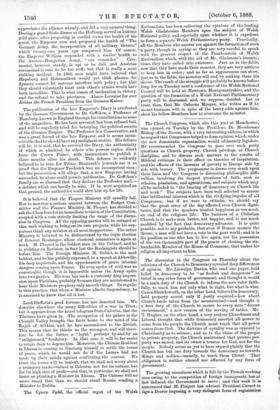The Church Congress, which sits this year at Manchester, was
opened on Tuesday by the President, Dr. Moorhouse; Bishop of the diocese, with a very interesting address, in which he argued that Congresses helped to form opinion, which, under the new democratic organisation, would ultimately legislate. He recommended the Congress to pass over such petty questions as Church property, Church privilege, or Church discipline, and to discuss such matters as the results of Biblical criticism in their effect on theories of inspiration, and the effects of the increase of poverty in Europe side by side with luxury. The programme is drawn very much upon these lines, and the Congress is discussing philosophic diffi- culties, involving the deepest questions of faith, such as atheism, pessimism, and agnosticism, and subjects which may all be included in " the bearing of democracy on Church life and work." The subjects have been well selected to arouse that intellectual interest which is the vivifying impulse of all Congresses ; but if we were to criticise, we should say that the great error of the day affected even Church digni- taries, and that the speakers treated happiness as too much an end of the religious life. The business of a Christian Church is to make men better, not happier, and is not much modified by the fact that democracy advances. It is quite possible, not to say probable, that even if Demos mounts the throne, a man will not have a vote in thepext world; and it is his position as one who has to live again, not his possession of the ten-thousandth part. of the power of electing the six- hundredth Member of the House of Commons, that makes his religion all-important to him.


































 Previous page
Previous page